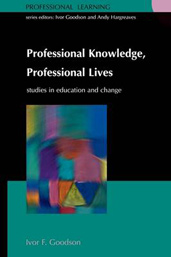Professional Knowledge, Professional Lives: studies in education and change
Educational Research as a Public Intellectual
I am trying to deal with these other questions in work I am undertaking at the moment. One way to sidestep the whole question is to embrace the definition of intellectuals provided in the Dictionary of Scientific Quotations. Tadeusz Kotarbinski is credited with the quote "an intellectual is a parasite that exudes culture" (Kotarbinski, 1997).
So if the public aspect of the public intellectual seems increasingly perilous under post-modernity, let us examine the place of intellectuals more generally. In Britain this place has, of course, always been contested whether within modernity or after modernity.
Noel Annan though, judges that post-war academics enjoyed a golden age of influence - he judges the period up until 1975 was the 'Age of the Don'. Certainly, as we have seen in the case of CARE, there was, for a period, a fruitful exchange between parts of the political establishment and educational researchers - public policy and public intellectual work were briefly linked.The link itself, of course, begs the question. For when the establishment changes tide as happened in the 1970s, the role of public intellectual becomes instantly questionable in terms of the humanistic values expressed by those such as Stenhouse. AH Halsey has ruminated also on this matter in a recent book about the Academy. He judges that British academics fall into two groups. The largest is a group who see themselves as increasingly specialist professions with a primarily conservative emphasis.
First this somewhat heterogeneous collection of increasingly specialist professions is, in a cultural sense, conservative. This conservatism reflects in part the distinctive character of secure attachment to the State and the social order which has earned the description of the British 'key' profession as pragmatic and useful - a ready servant of government administration and industrial need.
No one wishes to be labelled an intellectual, and worse, the intelligentsia is a dated, obscure class of foreign dissidents. Anti-intellectualism in this sense has been a feature of British culture at least since the reform and revival of the universities by the Victorians. The structure of British society has offered continually renewed support for these sentiments. There are professional rewards for specialists both within the academy and outside in the House of Lords, the boardrooms of industrial companies, the mass media, the governing bodies of quangos, and even the political parties. There have been, in short, powerfully integrating forces working to make scientists and scholars 'at home' in their society (Halsey, 1992).
